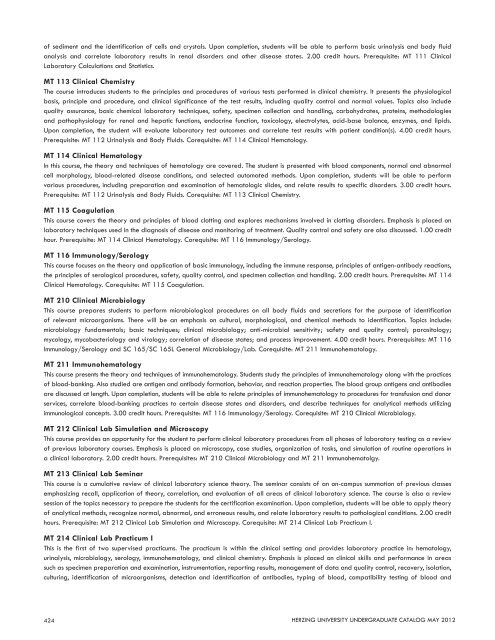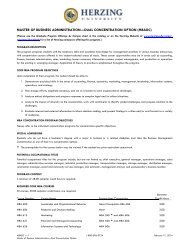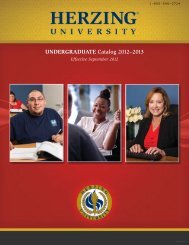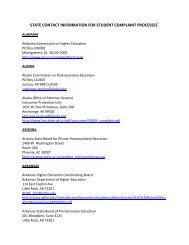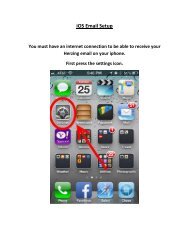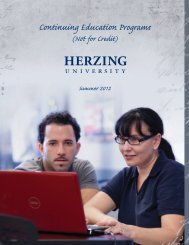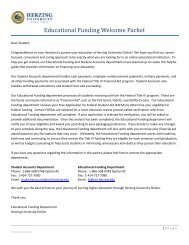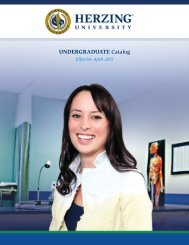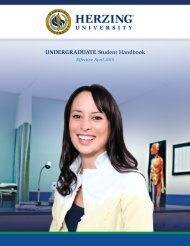Undergraduate - Herzing University
Undergraduate - Herzing University
Undergraduate - Herzing University
Create successful ePaper yourself
Turn your PDF publications into a flip-book with our unique Google optimized e-Paper software.
of sediment and the identification of cells and crystals. Upon completion, students will be able to perform basic urinalysis and body fluidanalysis and correlate laboratory results in renal disorders and other disease states. 2.00 credit hours. Prerequisite: MT 111 ClinicalLaboratory Calculations and Statistics.MT 113 Clinical ChemistryThe course introduces students to the principles and procedures of various tests performed in clinical chemistry. It presents the physiologicalbasis, principle and procedure, and clinical significance of the test results, including quality control and normal values. Topics also includequality assurance, basic chemical laboratory techniques, safety, specimen collection and handling, carbohydrates, proteins, methodologiesand pathophysiology for renal and hepatic functions, endocrine function, toxicology, electrolytes, acid-base balance, enzymes, and lipids.Upon completion, the student will evaluate laboratory test outcomes and correlate test results with patient condition(s). 4.00 credit hours.Prerequisite: MT 112 Urinalysis and Body Fluids. Corequisite: MT 114 Clinical Hematology.MT 114 Clinical HematologyIn this course, the theory and techniques of hematology are covered. The student is presented with blood components, normal and abnormalcell morphology, blood-related disease conditions, and selected automated methods. Upon completion, students will be able to performvarious procedures, including preparation and examination of hematologic slides, and relate results to specific disorders. 3.00 credit hours.Prerequisite: MT 112 Urinalysis and Body Fluids. Corequisite: MT 113 Clinical Chemistry.MT 115 CoagulationThis course covers the theory and principles of blood clotting and explores mechanisms involved in clotting disorders. Emphasis is placed onlaboratory techniques used in the diagnosis of disease and monitoring of treatment. Quality control and safety are also discussed. 1.00 credithour. Prerequisite: MT 114 Clinical Hematology. Corequisite: MT 116 Immunology/Serology.MT 116 Immunology/SerologyThis course focuses on the theory and application of basic immunology, including the immune response, principles of antigen-antibody reactions,the principles of serological procedures, safety, quality control, and specimen collection and handling. 2.00 credit hours. Prerequisite: MT 114Clinical Hematology. Corequisite: MT 115 Coagulation.MT 210 Clinical MicrobiologyThis course prepares students to perform microbiological procedures on all body fluids and secretions for the purpose of identificationof relevant microorganisms. There will be an emphasis on cultural, morphological, and chemical methods to identification. Topics include:microbiology fundamentals; basic techniques; clinical microbiology; anti-microbial sensitivity; safety and quality control; parasitology;mycology, mycobacteriology and virology; correlation of disease states; and process improvement. 4.00 credit hours. Prerequisites: MT 116Immunology/Serology and SC 165/SC 165L General Microbiology/Lab. Corequisite: MT 211 Immunohematology.MT 211 ImmunohematologyThis course presents the theory and techniques of immunohematology. Students study the principles of immunohematology along with the practicesof blood-banking. Also studied are antigen and antibody formation, behavior, and reaction properties. The blood group antigens and antibodiesare discussed at length. Upon completion, students will be able to relate principles of immunohematology to procedures for transfusion and donorservices, correlate blood-banking practices to certain disease states and disorders, and describe techniques for analytical methods utilizingimmunological concepts. 3.00 credit hours. Prerequisite: MT 116 Immunology/Serology. Corequisite: MT 210 Clinical Microbiology.MT 212 Clinical Lab Simulation and MicroscopyThis course provides an opportunity for the student to perform clinical laboratory procedures from all phases of laboratory testing as a reviewof previous laboratory courses. Emphasis is placed on microscopy, case studies, organization of tasks, and simulation of routine operations ina clinical laboratory. 2.00 credit hours. Prerequisites: MT 210 Clinical Microbiology and MT 211 Immunohematolgy.MT 213 Clinical Lab SeminarThis course is a cumulative review of clinical laboratory science theory. The seminar consists of an on-campus summation of previous classesemphasizing recall, application of theory, correlation, and evaluation of all areas of clinical laboratory science. The course is also a reviewsession of the topics necessary to prepare the students for the certification examination. Upon completion, students will be able to apply theoryof analytical methods, recognize normal, abnormal, and erroneous results, and relate laboratory results to pathological conditions. 2.00 credithours. Prerequisite: MT 212 Clinical Lab Simulation and Microscopy. Corequisite: MT 214 Clinical Lab Practicum I.MT 214 Clinical Lab Practicum IThis is the first of two supervised practicums. The practicum is within the clinical setting and provides laboratory practice in: hematology,urinalysis, microbiology, serology, immunohematology, and clinical chemistry. Emphasis is placed on clinical skills and performance in areassuch as specimen preparation and examination, instrumentation, reporting results, management of data and quality control, recovery, isolation,culturing, identification of microorganisms, detection and identification of antibodies, typing of blood, compatibility testing of blood and424 <strong>Herzing</strong> UNIVERSITY undergraduate Catalog May 2012


